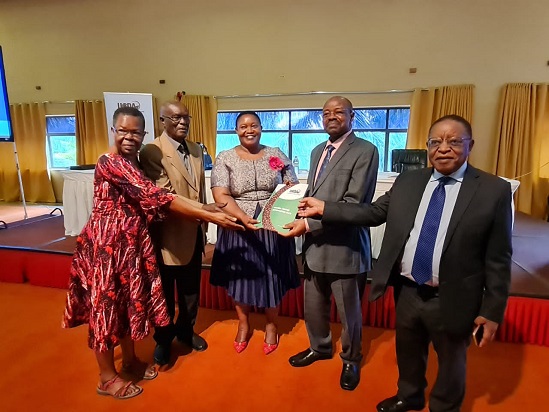Former Ministers, Victoria Ssekitoleko (L), Gerald Ssendaula (2nd L) and Prof Ezra Suruma (R) handing over the resolutions to Minister of the Presidency, Milly Babirye Babalanda (C). Also present was Amos Lugoloobi (2nd R), the State Minister of Finance and Planning.
Government and coffee stakeholders are committed to adding value to coffee so that Ugandans earn more money from the country’s leading cash crop.
Milly Babirye Babalanda, Minister of the Presidency, says although Uganda is Africa’s leading coffee exporter and 3rd best globally in producing quality coffee, the economic dividends of coffee to Uganda have been suppressed for long due to limited investment in value addition, weak domestic consumption and policy discords.
“Government should take action to strengthen the coffee sector to enhance its contribution towards social-economic transformation of Uganda,” Babalanda said.
The Minister made the remarks on Thursday, February 23, 2023 while closing the three-day Validation Workshop on the National Dialogue on developing the coffee value chain at Speke Resort Munyonyo.
The Validation Workshop was a follow-up on the National Coffee Dialogue held last month at Lake Victoria Serena Hotel, where a number of resolutions were made.
It was organized by the Office of the President in conjunction with Operation Wealth Creation (OWC) and Uganda Coffee Development Authority (UCDA).
Minister Babalanda formally received the resolutions of the coffee stakeholders on value addition and other emerging issues from former Finance Minister, Gerald Ssendaula, former Minister of Agriculture, Victoria Ssekitoleko and Prof. Ezra Suruma.
Amos Lugoloobi, the State Minister of Finance and Planning also attended the event on behalf of the Ministry of Finance, Planning and Economic Development.
Babalanda noted that the recent coffee dialogues are a result of President Yoweri Museveni’s document dated 2nd October 2022, entitled “Organizing Uganda’s Coffee Value Chain”, where the President raised fundamental questions regarding coffee value addition, especially on establishment of industrial production of coffee products in Uganda and the resultant social, economic and policy implications.
The Minister said since 1913 when commercial coffee production was introduced in Uganda, there has not been tangible investment in processing coffee into finished products to meet the demand in the international and domestic markets.
“Uganda has primarily remained a major exporter of green coffee beans as a raw material to industries in Europe,” Babalanda said, adding that Uganda can only celebrate being Africa’s leading exporter of coffee while remaining a donor of jobs to industrialized consumer countries. “The government has prioritized the need to attract investment in industrial processing of coffee, and this has generated positive debate in the past few months,” she said, adding that coffee remains an important and sensitive matter in the hearts of Ugandan farmers.
“I believe our role as Office of the President in leading the dialogue shall be temporary because I am aware that the National Coffee Act provides for establishment of an apex platform which would manage regular stakeholder engagements. I therefore, trust that this meeting has addressed fast tracking the implementation of this function,” Babalanda said, revealing that the Validation Workshop has reviewed over 17 issues and made refined actionable recommendations for Government consideration.
“I am glad that this workshop has interrogated all the issues affecting the coffee sub-sector, and made recommendations to inform government decisions. The Office of the President, is committed to support this process to a fruitful conclusion,” she said.
Key Resolutions
Speaking to the media on the sidelines of the workshop, Gerald Ssendaula, the former finance minister and the Chairperson of the National Union of Coffee Agribusinesses Farm Enterprises (NUCAFE), a coffee farmers’ national organisation, said coffee remains the most important crop for Uganda’s economy since it has been generating the much needed foreign exchange for the country for many decades.
He noted that for the coffee sub-sector to remain relevant, the coffee stakeholders have unanimously resolved that the Government rescinds its earlier decision to merge UCDA with the Ministry of Agriculture, Animal Industry and Fisheries (MAAIF).
He said Uganda’s coffee sub-sector has made a lot of progress since the creation of UCDA in 1991, noting that despite the devastating Coffee Wilt Disease, the country now produces over eight million bags and exports over six million bags of coffee, up from about two million bags about 10 years ago.
“The idea of taking UCDA to MAAIF isn’t just resented by people but we feel we need to make some input and Government has accepted that we can get together and exchange views. Are there sound reasons why the proposal to put UCDA in Ministry of Agriculture is not viable for the crop? It’s not proper (to merge UCDA with MAAIF) at this time. You need a lot of speed and care; you have to appreciate that coffee is food, so you need that speed of a commercial nature rather than the speed which is of a Civil Service kind of approach,” Ssendaula said.
He said if Uganda is to remain competitive in the global coffee arena, UCDA should be retained as an autonomous body to handle and coordinate all coffee-related activities.
“We have good examples of our own neighbours. Kenya were in the same boat. They created a coffee body, then dissolved it and took it back to the Ministry of Agriculture. The sector nearly collapsed; their coffee exports have reduced by nearly 50%. Ethiopia and Burundi took the same kind of approach but it did not work out. So, we are not reinventing the wheel. Exporters and other coffee stakeholders want speed, they want decisions made; you need that efficient and well-trained team to inspect the coffee, to assess its quality and ensure that a number of things that are so vital are proper,” he said.
He added that the stakeholders are not criticizing the Government but rather advising that the civil service protocols quite often cause unnecessary delays for example in decision making. He added that the stakeholders also resolved that more funding be earmarked for research so that there are better coffee varieties developed.
Former Minister of Agriculture, Victoria Ssekitoleko, said that coffee deserves special attention because it remains the largest foreign exchange earner for Uganda and the largest employer in Agriculture.
“If we are to create jobs, that’s the fastest way you can create jobs. What we are looking at now is intensifying everything in the coffee value chain-starting from research, seedlings, production, agronomy, processing, traders, all the way to the cup either in Uganda or abroad. We are looking at strengthening and maintaining the coffee sector in such a way that it keeps leading but with full support,” Ssekitoleko said.
On value addition, Ssekitoleko said value addition starts from the farmer because quality is key.
“Our aim is to get the 20 million 60kg bags (by 2030) regardless of the drought or diseases, but we want quality 20m bags. Fortunately, the market is insatiable; there’s much demand that Uganda can’t satisfy. We only need to improve the quality of the seedlings, the quality of the beans. It’s possible for many farmers to attain Screen 18 and 16 depending on how we maintain our gardens,” she said, emphasizing the fact that value addition is spread along the entire coffee value chain.
She said it will be a great deal for Uganda to set up a soluble coffee plant to produce soluble coffee in Uganda.
Joseph Nkandu, the Executive Director at NUCAFE, said the coffee stakeholders also looked at the institutional, policy and regulatory framework, with emphasis on coffee value addition.
He said Uganda has been earning too low from its coffee.
“Globally, by last Coffee Year, the coffee industry generated US$460bn but the coffee producing countries combined including Brazil, Colombia, Uganda and the rest earned an average of US$25bn. That’s about 5% of the global value. That’s too low. Out of the 5%, Uganda earned 0.17%. It means we have a lot more to do,” Nkandu said.
He noted that they also discussed the aspect of funding from Government for value addition.
“We don’t mean free money. Is there money in financial institutions that is ring fenced to finance the private sector? Because we also want to have Ugandans with a larger export market share,” Nkandu said, adding that foreign-owned coffee exporters have had a market share of over 80% for the last two decades.
He added that the stakeholders want farmer organizations and cooperatives strengthened to ensure that many farmers who produce coffee, the second most traded item in the world, are empowered.
“Farmers can best be empowered under farmer organizations and cooperatives,” he said.
Nkandu said Uganda coffee should be marketed with traceability.
“Thanks to Government, there are legal regimes that have been put in place including the Geographical Indications Act,2013. We want our coffee to be traced from the source of production. Our coffee shouldn’t get lost somewhere along the way which has been the case,” he said, adding that Uganda coffee will now be well positioned in the regional and international market.
He added that coffee stakeholders also discussed sustainability of the coffee sector.
“The future of Uganda coffee will be brighter if UCDA is maintained as an independent entity and supported to fully meet its mandate,” he said.
Willis Bashasha, the Director at Manifesto Implementation Unit under the Office of the President, said the key resolutions handed over to Minister Babalanda will be tabled before the Cabinet for review and consideration.






